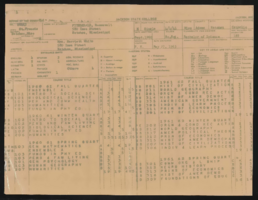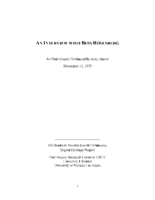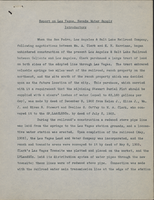Search the Special Collections and Archives Portal
Search Results

Transcript of interview with Joe Lappin by Gordon Brusso, March 4, 1976
Date
Archival Collection
Description
On March 4, 1976, Gordon Brusso interviewed former miner, Joe Lappin (born November 14th, 1914 in Santa Paula, California) about his life in Boulder City, Nevada. The two discuss his early occupational history and his work for the Bureau of Mines. He then goes on to explain the different housing systems that developed in Boulder City during World War Two.
Text

Transcript of interview with Hal G. Curtis by Bill Teepe, February 24, 1977
Date
Archival Collection
Description
On February 24, 1977, Bill Teepe interviewed Hal G. Curtis (born 1926 in Galt City, California) about his life in Southern Nevada. Curtis talks first about his work on the Union Pacific Railroad before discussing changes and development in Las Vegas, including development on the Strip and Downtown areas. He also talks about Block 16, the El Rancho Vegas fire, social clubs, and religion.
Text

Transcript of interview with Ed Fleming by Mark Lucas, February 8, 1977
Date
Archival Collection
Description
On February 8, 1977, Mark Lucas interviewed Edmund “Ed” Fleming (born 1915 in Virginia, Minnesota) about his experience in Southern Nevada. Fleming first talks about his moves to and from Nevada before describing the mining practices within the small towns in Southern Nevada. He also talks about his experience as a teacher in Pahrump and Goodsprings and his eventual move to Las Vegas, where he continued in the educational field. Fleming also talks about religion, transportation, funding for education, inflation, and cultural arts as they all relate to Las Vegas.
Text

Roosevelt Fitzgerald curriculum vitae, diplomas, and college transcripts
Date
Archival Collection
Description
From the Roosevelt Fitzgerald Professional Papers (MS-01082) -- Personal and professional papers file. (Transcripts less than 75 years old are restricted.)
Text

Transcript of interview with Joseph Thiriot by Claytee White, August 10, 2000
Date
Archival Collection
Description
Joseph Thiriot is a longtime Las Vegas resident who served the community as an educator. He was born in 1906 in Provo, Utah; one of five sons bom to George W. and Elvira Thiriot. He has vivid memories of moving about, including living in Idaho where his father sold a typing machine , a forerunner to the typewriter. Eventually the family moved to a ranch in Pahranagat Valley, Nevada, where the limits of educational opportunities compelled his paients to send him back to Provo to finish his education while living with family there. Gaining a teaching certificate enabled Joseph to teach in rural Nevada. He completed his degree at the University of Utah and after meeting Las Vegas Superintendent Maude Frazier he relocated to Las Vegas to become a teacher. He reminisces about his life and the changes that have occurred over the years in Las Vegas.
Text

Transcript of interview with Bess Rosenberg by Jerry Masini, November 12, 1975
Date
Archival Collection
Description
Interview with Bess Rosenberg by Jerry Masini on November 12, 1975. In this interview, Rosenberg describes coming to Las Vegas in 1942, and the desert landscape. She gives an in-depth recollection of the first atomic test, and talks about different weather and the seasons in Las Vegas. Rosenberg describes several clubs and hotels around downtown and the recreation at Lake Mead and Mount Charleston.
Text

Report on the water supply in Las Vegas, March 25, 1942
Date
Archival Collection
Description
Brief history of water in Las Vegas and overview of the water situation
Text

Transcript of interview with Bruce M. Eaton by Jay Brewer, April 24, 1975
Date
Archival Collection
Description
On April 24, 1975, Jay Brewer interviewed Bruce M. Eaton (born 1904 in Toronto, Kansas) about his life in Nevada and more specifically on the growth of Boulder City. Eaton first talks about his family’s move to Nevada and his work as a laborer for Six Companies during the construction of the Boulder Dam and his eventual employment with the Bureau of Reclamation as a general foreman. He also talks about the work conditions on the Boulder Dam, including the protection by Army personnel during the time of World War II. Eaton also describes the details of a federal investigation involving Eaton, a case of suspected espionage, and some of the racial conflicts that existed at the dam. Eaton then discusses his enlistment into the United States Navy and the incident that led him to be medically discharged before a deployment. He then describes the role of several Nevada legislators in helping the growth of Boulder City and his interactions with them. Eaton then discusses his role as city manag
Text

Transcript of meeting regarding the Las Vegas Valley Water District, held under the auspices of Las Vegas Chamber of Commerce, October 1, 1948
Date
Archival Collection
Description
Transcript of a meeting to discuss the creation of the Las Vegas Valley Water District
Text

Transcript of interview with James Bonnell by Gerald L. Conner, February 22, 1977
Date
Archival Collection
Description
On February 22, 1977, James Bonnell interviewed Gerald L. Connor (born 1930 in Boston, Massachusetts) about his experiences in Nevada and his work in education. Connor first talks about his move to Nevada while he was a member of the United States Air Force. He then discusses his education, including that at the University of Nevada, Las Vegas, and also describes his church membership. Connor later talks about changes in the schools and school district, the growth of gambling and properties located in Downtown Las Vegas and the Las Vegas Strip, and the early atomic tests at the Nevada Test Site. He also describes in detail his political activity and involvement with the Democratic Party, including his work with candidates for the offices of Nevada Governor and United States Senator. Towards the end of the interview, Connor talks about events such as Helldorado, the growth of the city over time, and his thoughts on the future of Las Vegas.
Text
